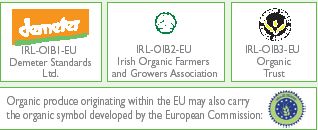by: Davinos Greeno
Organic produce is one of the fastest growing food retail sectors in the country.
Health scares such as BSE and foot-and-mouth, plus fears of GM crops/food and synthetic dyes and ingredients such as Sudan1 have led to considerable growth in the organic and the healthy food market as worried consumers seek out more healthy and natural products.
Recent research by market analysts nVision suggests four in ten adults now choose organic options on a regular basis. Organic supermarkets in England are booming and Europe's biggest organic event, the Biofach exhibition in Germany in getting bigger every year.
Unfortunately, at the moment retailers are charging artificially high prices. I was in Tesco last week which is a rare occurrence as I shop locally where possible, and I nearly died when I saw the prices being charged for organic yogurt and eggs compared to the non-organic brands. Its about time that the government started to investigate these organic suppliers and supermarkets to see who is ripping us off! Encouraging competition is not always a good idea as this can drives down prices (good for the consumer) which can put organic suppliers out of business if they have small profit margins. I understand that we have to pay more for organic produce because there are more crop failures due to the fact that the farmers cannot use pesticides, but what is an acceptable percentage and does this vary from product to product. Should organic fish be 10 percent more expensive than non organic fish and vegetables 20 per cent etc?
Once only available in small health shops or farmers markets, organic foods are becoming much more widely available. In the past 10 years sales of organic food in the UK have increased over 10-fold from £100m in 1993/94 to nearly £1.4bn in 2004/05. This large growth is predicted to continue, and many companies are jumping into the market. Sales through farmers markets and farm shops have grown faster than any other retail outlet. Organic food and drink now accounts for 1.2 per cent of the total retail market (Source Soil Association).
There are two types of organic foods.
Fresh food
Fresh food is seasonal and perishable. Vegetables and fruits are the most available type of organic, fresh food, and are closely associated with organic farming. They are often purchased directly from growers, at farmers markets, supermarkets or through speciality food stores. Organic meat, eggs, dairy are also available.Processed food
Processed food accounts for most of the items in a supermarket. Often, within the same store, both organic and conventional versions of products are available, and the price of the organic version is usually higher as already mentioned. Most processed organic food comes from larger companies producing and marketing products like organic baby food, organic beer, organic pasta or other convenience foods.How do I know its organic?
The term organic is defined by law - all organic food production and processing is governed by a strict set of rules. Look for symbols such as the Soil Association symbol for your guarantee of the highest organic standards. The Soil Association organic symbol is the UK's largest and most recognisable trademark for organic produce. Wherever you see it you can be sure that the food you have purchased has been produced and processed to strict and rigorous animal welfare and environmental standards. Other symbols to look out for include the Organic Food Federation and Certified Organic Ingredients.Most people don't have enough time to read the labels of all the different food products that they buy to check for organic ingredients. So look for the various symbols, you can then be sure that the product complies with minimum government standards.
The use of such symbols is entirely optional and a product can still be organic even though if it doesn't carry the symbol of a certifying body. That means if you want to be 100% satisfied that what you are eating or using is organic always read the label or speak to the vendor.
Where you will find the symbol? - Look out for organic symbols on almost any kind of food and drink you can think of from fresh produce like fruit, vegetables and meat to processed foods such as bread or baby food. You can even buy organic pet food!
Here are some examples (Source:Organic Leaflet)(Close new window to get back to this page):

About The Author
Davinos Greeno works with the Organic and Eco directory Guide Me Green (close new window to get back to this page). This growing green products directory lists 100s of Organic, Fairtrade, Eco and Ethical companies, jobs http://www.jobs.guidemegreen.com and Campaigning Videos Guide Me Green (close new window to get back to this page).
No comments:
Post a Comment